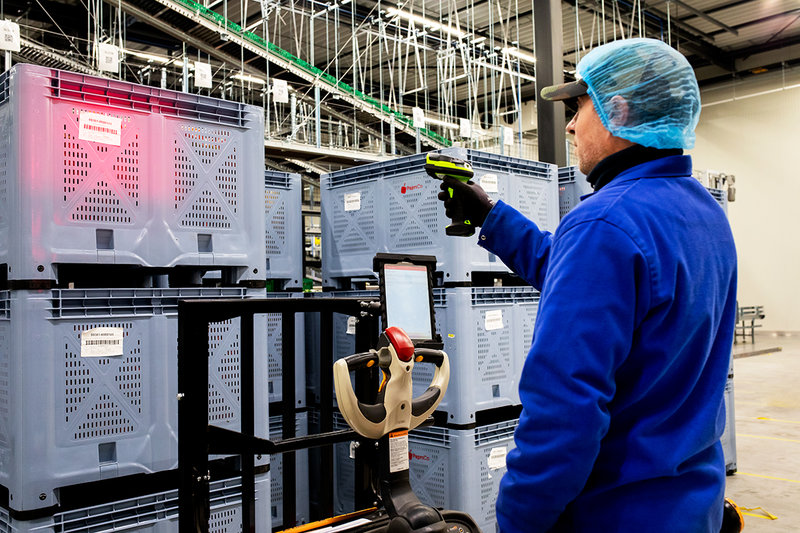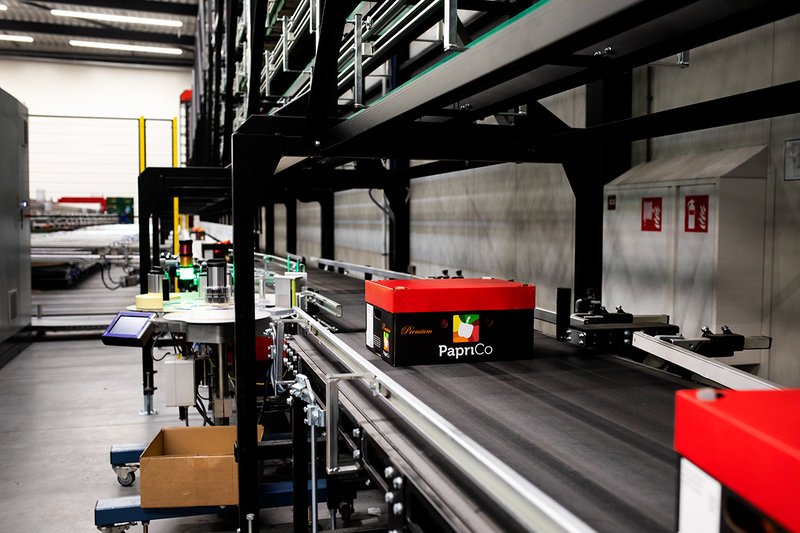Peace and overview through digitalization at PapriCo

“It provides peace and overview,” says Mark Borst, director of the Zwaagdijk location of Growers United, one of the biggest advantages that the new DC brings. "In the past we had little automation and we still did a lot by hand. Now the system is much more leading and the entire processes become transparent so that we can manage them better.”
In July 2022, Cooperative Growers United started building a new DC in Zwaagdijk, especially for packaging and sorting the block peppers of the PapriCo brand. Communication between the various parties was important in the digitization of the DC, Mark indicates. “That was actually the gist. You want to be able to use the data in the right way, but ultimately it is also about all parties being able to work together in the right way.”
Different locations
Cultivation (spread over five cultivation locations), the DC in Zwaagdijk, sales and associated support in Maasdijk are all housed in different locations, Mark notes. “Then you want to organize that well.” Growers United reached out to jem-id, which had previously carried out automation projects for the Cooperative.
“We tried to stay true to ourselves as much as possible. In the previous situation we also worked with GreenCommerce from jem-id. So it is mainly an extension of the existing one. That step was reasonably easy for the employees,” says Mark.
Technical partners
Next, jem-id mapped out the wishes of all parties. “In addition to the physical distance between the DC in Zwaagdijk and the sales of Growers United in Maasdijk, we had to deal with the technical partners who took care of the entire automation and sorting process. They also need their information at the right times and have their own technical options for this,” says jem-id project coordinator Berry van Zijp.
“It was mainly a challenge to find what the best solution was for which situation.” Berry indicates that existing options have been examined as much as possible. “You can come up with new ideas, but everything that already exists is an advantage for all parties.” He indicates that it has resulted in a system that partly - where communication with the machinery is concerned - consists of customization and partly of solutions that jem-id already had available in its portfolio.
Communication platform
“The latter mainly applies to the communication between the sales system and the DC. This revolves around our FreshBabel communication platform, which is already used by many other parties. We have created a number of extensions to message formation specifically for this project. We were able to make use of existing techniques to a large extent. Proven techniques too, because many other parties have been working with them for several years and it continues to grow. Through these types of projects, the platform as a whole has also been expanded with new possibilities.” said Berry.
It was important that the packing process must always be able to continue for PapriCo's growers, even if a malfunction occurs somewhere, Mark indicates. “We work with multiple parties and what we always wanted to avoid is that if one of the parties has a technical malfunction, the rest of the packing process also comes to a standstill. You want the sensitivity to interference to be as low as possible. If there is a disruption now, it is limited to a certain segment of the line or department.”

Independence
Berry indicates that this has been achieved by ensuring that all parts of the system can run independently of each other. “If party A is in trouble, B and C must be able to continue as usual; so all systems can run independently of each other. By making manual registrations in certain systems, where this would normally be automatic, there is no downtime.”
The same care is visible in the implementation of the system: the most critical components first and then a step-by-step introduction of the supporting facets, says Mark. “We did not roll out an entire package at once. We have implemented both the machinery and the software surrounding it step by step. By introducing one section at a time, we were able to iron out the teething problems before the next step was implemented. I think that has created fewer problems.”
Smoother start in the new season
Although not without risk, it was a conscious choice by PapriCo to start rolling out the system during the season and not during the quiet period. Mark: “If we had implemented everything in the winter, everything would have seemed great on paper and you would have done some testing, but you learn best in practice. That is why we switched in the middle of the season, so that you can gain experience for a few months and resolve teething problems, so that you can get off to a much smoother start at the start of the new season.”
Both Mark and Berry note that there were few problems with the implementation. Mark: “Everyone felt ownership of a problem and all parties – both jem-id, but also the suppliers of the automation and the sorting process – jointly gave their all. I think this has been one of the main reasons that we have had relatively few teething problems and initial problems.”
180 kilos of supply
While the main choice has been made to work with proven techniques, this does not apply to the application of vision technology in sorting - which PapriCo was one of the first to apply - and the switch to a supply system that works with 180 kilo boxes. Mark indicates. “We can empty those boxes in doses. We do not work with a standard box tipper; We can indicate in advance how many kilos of a certain grade or batch should be deposited on which belt.”
Although Artificial Intelligence (AI), other than in the camera system of the sorting machine, has not been applied in the digitization process, the subject is on the radar of both jem-id and Growers United. Berry: “These are topics that we follow closely and, where possible, also investigate in terms of application.” And the growers' association also remains informed. “We are monitoring it, but for the system we have now implemented, AI does not have an immediate impact. If we include this in the digitalization process, it will mainly be in the logistics part: putting it in the machine and packing,” Mark concludes.
Questions or more information?
Contact us at info@greencommerce.nl or call +31 174 - 642 622.
Read the article (Dutch only) in the Primeur via this link.